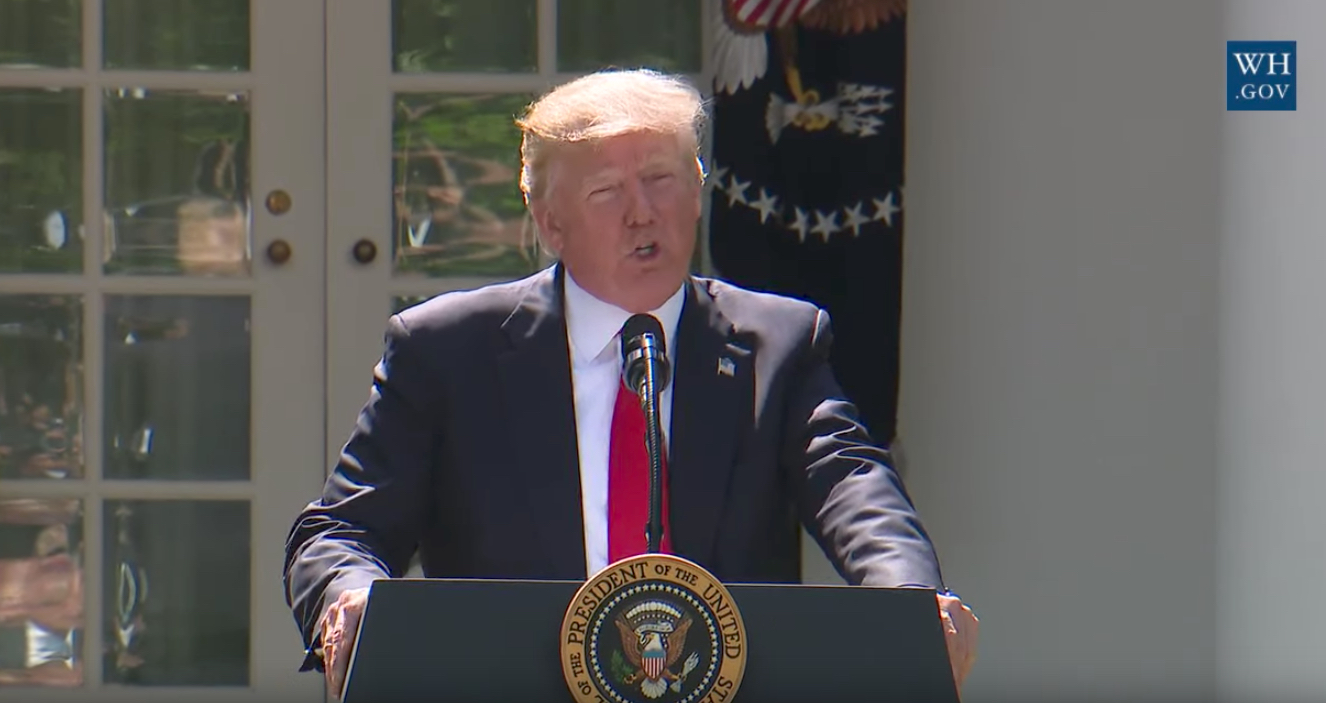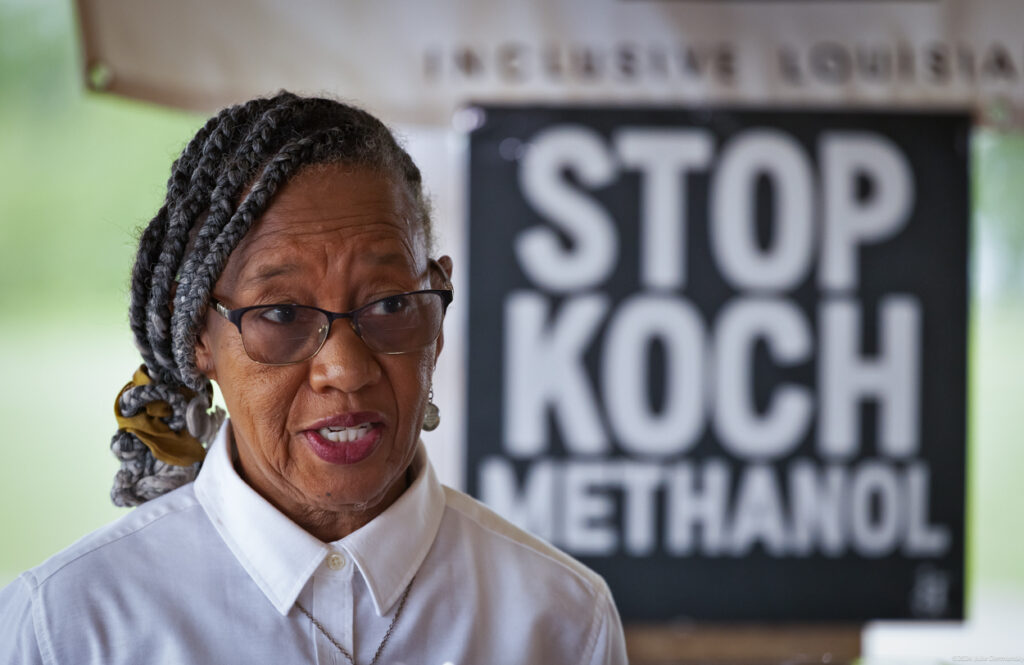President Donald Trump made his decision official during a speech outside the White House today: the U.S. will be leaving the Paris Accord agreement by almost 200 other countries to cut global greenhouse gas emissions.
Trump, who arrived over a half-hour late for his scheduled 3PM announcement, told the gathered press corps that the U.S. would withdraw from the Paris accord in November 2020.
“The United States will withdraw from the Paris climate accord,” Trump said, “but begin negotiations to re-enter either the Paris accord or an entirely new transaction on terms that are fair to the United States and its businesses, workers and taxpayers.”
“We’ll see if we can make a deal that’s fair,” he added. “If we can, that’s great. If we can’t, that’s fine.”
“Our President is choosing to put American energy and American industry first,” Vice President said as he introduced Mr. Trump.
Less than an hour before the Rose Garden press conference was slated to begin, CNN reported that the White House had told Congress that a pull out was imminent.
Hill source: WH has informed members of Congress that President Trump will pull out of Paris climate agreement.
— Jim Acosta (@Acosta) June 1, 2017
“We will initiate the process, which, all told, takes four years in total,” White House energy policy adviser and former fossil fuel lobbyist Michael Catanzaro told Congressional staffers in a conference call just before Trump’s speech. “But we’re going to make very clear to the world that we’re not going to be abiding by what the previous administration agreed to.”
Condemnation from environmental groups was swift.
“President Trump’s decision to exit the Paris Climate Agreement sends a dangerous signal to the rest of the world that the United States values fossil fuel industry profits over clean energy innovation and the health and well-being of our citizens,” Earthworks’ Executive Director, Jennifer Krill said in a statement. “The over 12 million people living within a half mile of an oil and gas facilities deserve action to reduce air pollution, not head-in-the-sand climate denial.”
Political centrists also bemoaned the President’s choice. “Protecting American interests in a complex, connected, and unfortunately dangerous world requires partnerships and reciprocity,” Bipartisan Policy Center President Jason Grumet said in a statement. “This decision has troubling implications far beyond the climate issue.”
On the campaign trail, Mr. Trump repeatedly pledged his administration would drop the Paris accord. But under immense pressure from world leaders, the business community, and his daughter Ivanka, Mr. Trump had seemed to hesitate.
He teased his Paris decision on Twitter for days before making an official announcement of his decision.
I will be announcing my decision on Paris Accord, Thursday at 3:00 P.M. The White House Rose Garden. MAKE AMERICA GREAT AGAIN!
— Donald J. Trump (@realDonaldTrump) June 1, 2017
Trump’s drawn out decision-making process had many commentators comparing the announcement to a reality-T.V. finale – though the conclusion could substantially impact the lives and livelihood of virtually every person on Earth, if the U.S. fails to significantly reduce its greenhouse gas emissions.
For all the showmanship, Trump’s decision on the Paris accord was overshadowed on Wall Street by a broader commodities sell-off. Shares in coal mining companies as well as oil and gas producers slid on Wednesday, weighed down by low prices, with some coal investors fearing a backlash from a U.S. exit from Paris.
The political crisis, which spurred alarmed reactions from world leaders, corporate CEO‘s and major businesses, and environmental groups alike, has been almost entirely of Trump’s own manufacture.
A narrow coalition of 22 Senate Republicans (a group of politicians who’ve taken a combined $10 million in campaign contributions from the fossil fuel industries, a Guardian investigation noted), a handful of state attorneys general, and climate science denying think tanks pressed Trump to keep his campaign-trail pledge by abandoning the pledge of the U.S. government.
.@POTUS is betraying the country, in service of Breitbart fake news, the fossil fuel industry, & the Koch brothers’ climate denial operation pic.twitter.com/J3YwrORboA
— Sheldon Whitehouse (@SenWhitehouse) June 1, 2017
In the other corner, an array of unlikely allies ranging from the Pentagon and the Kremlin, oil giants and environmental groups, along with 40 Senate Democrats plus Republican Senators Bob Corker (TN), Lindsay Graham (SC) and Susan Collins (ME), have all urged that the U.S. take its climate obligations seriously.
Members of the President’s party have struggled to articulate why exactly the U.S. should leave the international agreement. “Obviously there’s some concern that there’s obligations under the accord that the President doesn’t want to – have those obligations,” said Lousisana Republican Senator William Cassidy, when a reporter asked what the upside to leaving Paris might be. Sen. Cassidy, who described himself as “neutral” on staying or leaving, added, “and that’s why he gets paid the big bucks.”
Video Credit: Julie Dermansky, © 2017
The Paris accord has been criticized as too weak to address the scale of the climate crisis. Shortly after the November election, the International Energy Agency warned that even if all of the signatories to Paris fulfilled their pledges, carbon emissions would continue to rise, just at a slower pace. “While this is a significant achievement, it is far from enough to avoid the worst impact of climate change as it would only limit the rise in average global temperatures to 2.7°C by 2100,” the IEA wrote. That’s nearly double the 1.5° C warming target that was heavily debated during the Paris negotiations. The accord ultimately called for efforts to keep temperatures “well below 2 °C above pre-industrial levels.”
Two degrees of warming could leave many American cities partially underwater, cause crop failures, increase the severity of storms, and make it unlikely for coral reefs to survive. Between two and three degrees, predictions become extraordinarily grim and experts warn of crossing a tipping point where natural processes that pull carbon from the atmosphere could reverse or a melting permafrost could unleash vast amounts of methane.
Still the Paris agreement had been hailed as unprecedented in scale and scope, reflecting an extraordinarily rare global consensus. “The greatest triumph of the Paris climate agreement is that there is an agreement at all,” the Atlantic’s Robinson Myer wrote.
“Global South and Global North countries alike have grave concerns with the Trump administration’s head-in-sand views on climate change,” Corporate Accountability International President Kelle Louaillier said in a statement. “The global community must move forward, leave Trump, Tillerson and their oil lackeys behind, and advance lifesaving climate policy now.”
Subscribe to our newsletter
Stay up to date with DeSmog news and alerts






